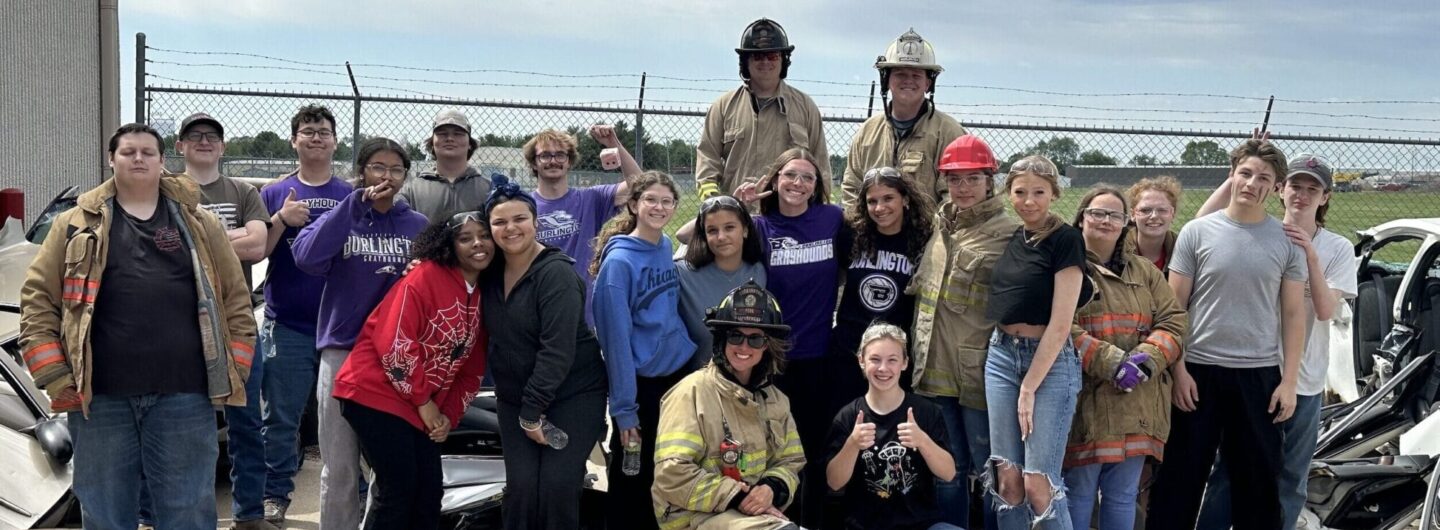The Public Safety pathway became the newest addition to Burlington High School’s Cte offerings in 2023 in response to student interest and local workforce needs.
The pathway is designed to prepare students for careers in fire services, emergency medical services, law enforcement, and other public safety professions. This pathway offers a unique blend of theoretical knowledge and practical skills, enabling students to explore and experience the multifaceted world of public safety. Through classroom instruction, hands-on activities, and interactions with local industry professionals, students will develop the competencies needed to excel in public safety roles and make a meaningful impact in their communities.
Public Safety Pathway at a Glance
Public Safety Courses
Introduction to Public Safety, Advanced Public Safety, Criminal Justice Essentials, Forensic Science and Criminal Investigations
Other Suggested Courses
Healthcare Occupation Exploration, Healthcare Systems, Intro to Patient Care I & II, Common Procedures in Healthcare
Check out the Program of Studies for a complete list of course offerings and descriptions.
National Public Safety Statistics
| Firefighter | Police/Detective | |
| 2023 U.S. median pay | $51,120 per year/$27.46 per hour | $74,910 per year/$36.02 per hour |
| No. of jobs in 2022 | 334,200 | 808,700 |
| Projected need | 26,400 annually | 64,500 annually |
Southeast Iowa Workforce Statistics
| Firefighter | Police/Detective | |
| Average wage | $23.33-$26.25 per hour | $30.75-$34.43 per hour |
| Openings per year | 25 | 55 |
Public Safety Courses, Learning Objectives & Areas of Focus
Introduction to Public Safety
This introductory course explores the training, tasks, and job skills utilized in fire services, emergency medical services, and law enforcement careers. Through a combination of readings, coursework, guest speakers, and activities, students gain an understanding of the various aspects of public safety professions and begin creating their Public Service Pathway Portfolio.
Advanced Public Safety
Building on the foundational knowledge from the Introduction to Public Safety, this course delves into the applications, procedures, and theories used in criminal justice, law enforcement, fire protection, and emergency response services. Emphasis is placed on communication skills, mathematical applications, problem-solving, ethics, and cultural diversity, with students documenting their experiences in their Public Service Pathway Portfolio.
Criminal Justice Essentials
This course provides an in-depth study of crime in America, the U.S. court system, and law enforcement efforts. Topics include victimization, due process, constitutional laws, sentencing, parole, and prison rehabilitation. Students will engage in rigorous studies of court proceedings, criminal investigations, custody procedures, emergency procedures, juvenile justice, patrol procedures, police operations, search and seizure, theories of criminal behavior, traffic control, and use of force.
Forensic Science and Criminal Investigations
Students in this course use scientific methods to investigate crimes and understand criminal behavior. The curriculum includes crime scene investigation, questioning techniques, criminal behavior characteristics, and scientific procedures for solving crimes. Practical applications include fingerprint analysis, trace evidence collection, ballistics, body fluid collection, and blood spatter analysis, with a focus on the history, legal aspects, and career options in forensic science.
Other Suggested Courses
Healthcare Occupation Exploration
This course introduces students to the various careers in health science, including therapeutic services, diagnostic services, health information, support services, and biotechnology research and development. Students will interact with professionals from each pathway, gaining insights into the diverse opportunities within the healthcare industry.
Healthcare Systems
Building on the knowledge from Healthcare Occupation Exploration, this course examines how the healthcare system functions at different levels. Students learn about individual and team responsibilities within the healthcare setting and apply their knowledge to solve real-life health or medical problems.
Introduction to Patient Care I and II
These courses introduce students to essential skills and concepts required for patient care. Students will focus on therapeutic and diagnostic career pathways, learning valuable skills applicable to various health science careers. Topics include basic patient care techniques and the skills needed for success in a patient care setting.
Common Procedures in Healthcare
This course covers essential skills and concepts needed in emergency medical situations. Students learn about emergency medical procedures, legal and ethical responsibilities, and earn certification in CPR/AED through the American Heart Association, providing a solid foundation for future careers in emergency medical services.


